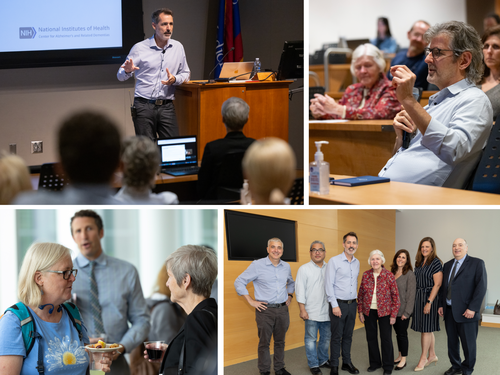On Monday, May 22, 2023, National Institutes of Health’s Andrew Singleton, PhD presented at the University of Pennsylvania as the Institute on Aging’s (IOA) 2023 Vincent J. Cristofalo Annual Lecturer.

Dr. Singleton focused his lecture on the importance of collaborative science in neurodegenerative disease research with a special emphasis on two models of this approach, the NIH’s Center for Alzheimer’s Disease and Related Dementias (CARD) and the Global Parkinson’s Genetics Program (GP2). Dr. Singleton is heavily involved with both CARD, serving as the Director of the center, and GP2, serving as the Lead of the Complex Disease Network.
“Both CARD and GP2, whilst they are separate entities, both are founded on this idea of collaborative science,” said Dr. Singleton. “And this is becoming more and more important.”
He explains that part of the reason why the field is accelerating discovery so much is because of the growth in the ability to produce massive sets of data to do large scale investigations and bringing together different skill sets in science. “Collaboration is key,” he said. “You have to work across disease boundaries, you have to work across disciplines and skill sets, and that is something that we really aim to do within CARD and within the GP2 program.”
GP2 not only strives for diversity among skillsets in its research, but also for diversity in the understanding of disease.
“A major aim of GP2 is to diversify our understanding of the genetic basis of disease and this is really important for several reasons,” said Dr. Singleton.
“We should be understanding disease across diverse populations,” said Dr. Singleton. “And this is particularly important because if we think about the advent of precision medicine and being able to treat the causes of disease in patient groups or in individual patients, we really need to understand what those causes are across all populations. GP2 is an attempt to do that -- to really understand what's the genetic architecture in different populations? Does it change between populations? What are the similarities? And how can we leverage those similarities and differences in our approach to understanding disease and ultimately to treating disease?”
About the Vincent J. Cristofalo Lectureship
This endowed Lectureship serves as an annual tribute to Dr. Vincent Cristofalo, an expert in cellular aging, a cherished mentor, and the founder of the Center for the Study of Aging, now the Institute on Aging (IOA), at the University of Pennsylvania. Read more here.
About Andrew Singleton, PhD
Andrew Singleton received his B.Sc. from the University of Sunderland, UK, and his Ph.D. from the University of Newcastle upon Tyne, UK. After postdoctoral work at the Mayo Clinic, Dr. Singleton moved to the National Institute on Aging. He became a senior investigator there in 2007, and Laboratory Chief in 2008. In 2016 he became an NIH Distinguished Investigator. In 2021 Dr. Singleton became the Director of the new Center for Alzheimer’s and Related Dementias within the Intramural Research Program of the National Institutes of Health.
Dr. Singleton has published more than 700 articles. His group works on the genetic basis of neurological disorders including Parkinson's disease, Alzheimer’s disease, dystonia, ataxia, dementia with Lewy bodies, and amyotrophic lateral sclerosis. The goal of this research is to identify genetic variability that causes or contributes to disease and to use this knowledge to understand the molecular processes underlying disease.
Dr. Singleton serves on several advisory and editorial boards. He has received the Annemarie Opprecht Award for Parkinson’s disease research, the Jay van Andel Award for Outstanding Achievement in Parkinson’s Disease Research, the American Academy of Neurology Movement Disorders Award, the Robert A Pritzker Prize for Leadership in Parkinson’s Disease, and an Honorary Doctorate from the University of Sunderland.
View Dr. Singleton’s full lecture here.
View more photos from the 2023 Vincent J. Cristofalo Annual Lectureship here.

